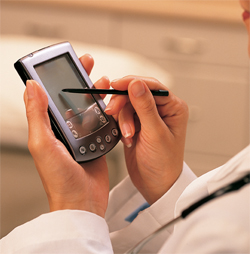The eRx Collaborative: Fast, Safe, Secure
A New England Journal of Medicine study found that a quarter of the patients in a Massachusetts population of adult primary care practices experienced an adverse drug event and 13 percent were serious.4 How can we eliminate these dangerous mistakes?

Easy-to-use, hand-held electronic prescribing devices replace paper prescription pads.
One of the best ways to reduce prescription drug errors is through technology. That's why we're working in partnership with doctors, pharmacies, and hospitals, as well as other health plans in the state, to make electronic prescriptions the rule in Massachusetts. Why? Because they're safer and, over time, will help to control the cost of health care.
The eRx Collaborative, which we helped to create, promotes patient safety by creating a computerized system that alerts doctors when there is the possibility of an adverse drug interaction or an allergic reaction. The eRx Collaborative also eliminates errors from a long-standing problem: illegible handwriting.
To date, more than 3,400 Massachusetts doctors and select clinicians have incorporated an ePrescribing system into their practices through the eRx Collaborative and have written more than three million electronic prescriptions. More than 70 percent of participating doctors and clinicians surveyed said they would recommend ePrescribing technology.
There is dramatic evidence that our ePrescribing program improves patient safety: on average, physicians changed more than 4,000 prescriptions per month as a result of drug-to-drug or allergy alerts issued through the program.
The eRx Collaborative:
- Improves patient safety
- Increases efficiency and reduces cost
- Identifies cost-saving medications for individual members
- Cuts doctors' administrative time
 Dr. Alan Silken, a pediatric
neurologist, says this of the eRx Collaborative: "I have found it to be the most comprehensive
and efficient ePrescribing program for me and my staff. All my renewals can be found in one place.
I went from spending two hours a day on renewals to 30 minutes."
Dr. Alan Silken, a pediatric
neurologist, says this of the eRx Collaborative: "I have found it to be the most comprehensive
and efficient ePrescribing program for me and my staff. All my renewals can be found in one place.
I went from spending two hours a day on renewals to 30 minutes."
The eRx Collaborative has the highest adoption and utilization rates of comparable programs anywhere in the country. It is a great success story and a model for the nation. Electronic prescriptions are a crucial first step toward creating a comprehensive system of Electronic Medical Records with clinical decision support – a system that has the potential to significantly improve the entire health care delivery system.
4 T.K. Gandhi et al., "Adverse Events in Ambulatory Care." New England Journal of Medicine, 348, no. 16 (April 2003): 1556-65.
